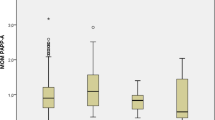Abstract
Aim and Objectives
To review the effects of obesity (BMI > 30) on antepartum risk/intrapartum risk. To study neonatal outcome of pregnant women with raised BMI.
Material Method
BMI of 500 pregnant women booked before 12 weeks calculated and categorised as normal, overweight, obese and morbidly obese at GMCH, Aurangabad. Pregnant women with systemic disease and previous LSCS were excluded. Antepartum, intrapartum and neonatal variables were studied, and statistical analysis was carried out.
Results
Antepartum variables: prolonged pregnancy (<0.05), severe PIH (<0.05), PPROM (<0.05), gestational DM (<0.05) and anaemia (<0.05) are strongly associated with raised BMI, whereas abortion (>0.05), oligohydramnios (>0.05), UTI (>0.05) and abruption (>0.05) are not associated with raised BMI. Postpartum variables: PPH (<0.05), pyrexia (<0.05), prolonged hospital stay (<0.05) and lactational dysfunction (<0.05) are strongly associated with raised BMI, whereas UTI (>0.05), thrombophlebitis (>0.05) and endometritis (>0.05) are not associated with raised BMI. BMI Neonatal outcome: IUGR (<0.05), preterm (<0.05), postterm (<0.05), LBW (<0.05) and macrosomia (>0.05) are strongly associated with raised BMI, whereas stillbirth (>0.05), intubation (>0.05), RDS (>0.05) and baby died within 24 (>0.05) are not associated with raised BMI.
Conclusions
Overweight and obesity are risk factors for AP/IP/PP complication.
Similar content being viewed by others
References
World Health Organisation. Diet, nutrition, and the prevention of diseases: report of a joint WHO/FAO expert consultation. Technical report series 916. Geneva, Switzerland: World Health Organisation; 2002.
World Health Organisation. Obesity and overweight. The highlighted should be changed to: accessed November 15 2011. http://www.who.int/mediacenter/factsheets/fs311/en/index.html.
Wang Y, Chen HJ, Shaikh S, et al. Is obesity becoming a public health problem in India? Examine the shift from under to overnutrition problems over time. Obes Rev. 2009;10:456–74.
Balranjan Y, Villamor E. Nationally representative surveys show recent increases in the prevalence of overweight and obesity among women of reproductive age in Bangladesh, Nepal, and India. J Nutr. 2009;139:2139–44.
Kumara P, Gupta M, Kahlon P, et al. Association between high BMI and feto-maternal outcome. J Obes Metab Res. 2014;3:143–4.
Vasudevan C, Renfrew M, McGuire W. Fetal and perinatal consequences of maternal obesity. Arch Dis Child Fetal Neonatal Ed. 2011;96:F378–82.
Garrow JS. Indices of adiposity. Nutr Abstr Rev Ser. 1983;A53:697–708.
Sebire NJ, Jolly M, Harris JP, et al. Maternal obesity and pregnancy outcome: a study of 287 213 pregnancies in London. Int J Obes Relat Metab Discord. 2001;25:1175–82.
Srivastava R, Sharma NR, Kushwaha KP, et al. Obstetrics behavior and pregnancy outcome in overweight and obese women. J Obstetrics Gynaecol India. 2012;62(3):276–80.
Mamula O, Severinski N, Mamula M, et al. Complications during pregnancy—labour and puerperium in women with increase BMI at pregnancy term. Cent Eur J Med. 2009;4(1):71–5.
Islam A, Khan NA, Ehsan A. Complications of raised BMI in pregnancy. Professor Med J. 2010;7(3):498–504.
Bhattachrya S, Campbell DM, Campbell WA, et al. Effect of body mass index on pregnancy outcome in nulliparous women delivering singleton baby. BMC Public Health. 2007;7:168.
Arrowsmith S, Susan W, Siobhan Q. Maternal obesity and labour complications following induction of labour in prolonged pregnancy. BJOG Int J Obstet Gynaecol. 2011;118(5):578–588. doi:10.1111/j.1471-0528.2010.02889.x
Yu C, et al. Obesity in Pregnancy. BJOG. 2006;113:1117–25.
Author information
Authors and Affiliations
Corresponding author
Ethics declarations
Conflict of interest
None.
Informed Consent
Taken from Patient.
Ethical Committee
Approval taken.
Additional information
Varsha L. Deshmukh is Associate Professor & Unit Incharge of Obstetrics and Gynaecology at Government Medical College; Milind Jadhav is Resident of Obstetrics and Gynaecology at Government Medical College; Kanan Yelikar is HOD of Obstetrics and Gynaecology at Government Medical College.
Rights and permissions
About this article
Cite this article
Deshmukh, V.L., Jadhav, M. & Yelikar, K. Impact of HIGH BMI on Pregnancy: Maternal and Foetal Outcome. J Obstet Gynecol India 66 (Suppl 1), 192–197 (2016). https://doi.org/10.1007/s13224-015-0825-3
Received:
Accepted:
Published:
Issue Date:
DOI: https://doi.org/10.1007/s13224-015-0825-3




